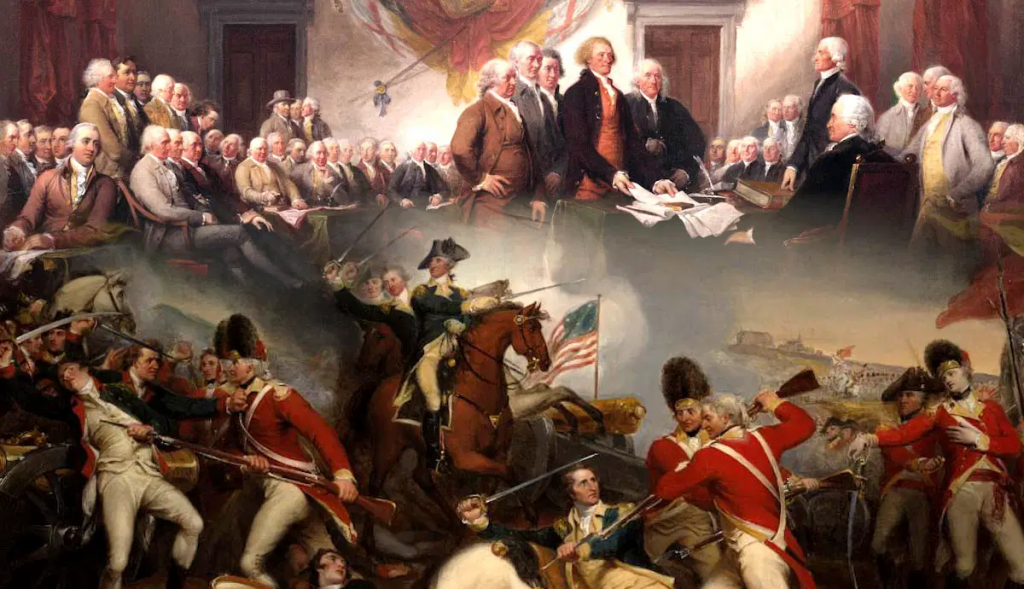When we talk about the American Revolution, we’re not just discussing a war. We’re talking about a messy, unexpected breakup—a classic case of a rebellious teenager storming out of the house, slamming the door, and declaring independence. Britain, the overbearing parent, never saw it coming. America, the unruly child, had its reasons. But like most family feuds, it didn’t have to end this way. So, what went wrong?

The Unlikely Beginnings of a Revolution
Revolutions usually happen for two big reasons: unbearable oppression or foreign invasion. Think of the French Revolution (1789) and the Russian Revolution (1917)—people were starving, rulers were corrupt, and rebellion was a matter of survival. But in 18th-century North America, things weren’t nearly as dire. In fact, life in the British colonies was pretty sweet compared to most of the world. The land was fertile, resources were abundant, and many colonists were doing quite well. From small business owners and farmers to lawyers and doctors, the American middle class was thriving.
Even politically, the colonies weren’t doing too badly. The British government largely left them alone, following a policy called “Salutary Neglect,” which basically meant, “Do whatever you want, just don’t cause trouble.” Most colonies had self-governing assemblies, and the British king and parliament rarely interfered. So, why did a group of relatively well-off, self-governing people suddenly decide to overthrow the most powerful empire in the world?
The Straw That Broke the Camel’s Back
Enter the French and Indian War (1756–1763), a costly conflict that ended in British victory but left Britain drowning in debt. To cover the costs, the British government looked at its colonies and thought, “Time to chip in, folks.” The problem? The colonies had been used to running their own financial affairs for over 160 years.
In 1764, Britain introduced the Sugar Act, imposing a small tax on imported sugar. No big deal, right? Wrong. For the first time, Britain was directly taxing the colonies without their consent. And worse, Parliament made it clear they weren’t stopping there. The Stamp Act of 1765 followed, taxing everything from newspapers to playing cards. Colonists, furious at this new intrusion, coined the now-famous phrase: “No taxation without representation!”
Britain’s Big Miscalculation
The British government didn’t get it. To them, the colonies were part of the empire, so of course, they should help pay for its defense. But the American colonists saw things differently. They had built their own economies, governed their own affairs, and now, suddenly, Britain wanted to micromanage them? Not happening.
The more Parliament pushed, the more the colonies resisted. Protests erupted. British goods were boycotted. Then came the Boston Tea Party (1773), where angry colonists, dressed as Native Americans, dumped British tea into the harbor rather than pay taxes on it. Britain retaliated with the Intolerable Acts, further tightening control. By 1775, tensions exploded into war.
A War That Shouldn’t Have Happened?
Looking back, the American Revolution wasn’t inevitable. Britain could have negotiated, maybe even offered the colonies a few seats in Parliament. The colonies, for their part, might have been less aggressive in their defiance. But history isn’t about “what ifs.” It’s about what happened, and what happened was a revolution that reshaped the world.
Interestingly, despite the war, America never completely severed ties with Britain. Many Founding Fathers, including George Washington, held a deep respect for British traditions. Even after independence, the U.S. remained culturally and economically connected to Britain, leading to today’s “special relationship” between the two nations.
The Legacy of the Revolution
The American Revolution was more than just a colonial rebellion—it was a battle over ideas. It planted the seeds of democracy, inspiring revolutions in France, Latin America, and beyond. It challenged the notion of absolute monarchy and set the stage for the modern world.
And yet, it all started with a seemingly simple question: Who gets to decide what’s fair? That question, in many ways, still echoes in modern politics.
One thing’s for sure—if the American Revolution teaches us anything, it’s that underestimating an independent-minded people is always a bad idea.

No comments yet.